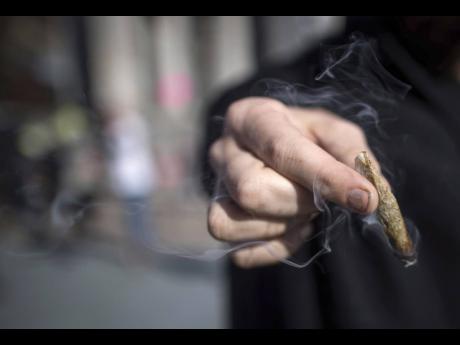Cedric Stephens | Driving under the influence of ganja
ADVISORY COLUMN: RISKS & INSURANCE
QUESTION: A few days ago, I saw a taxi driver in Papine smoking what looked like a big spliff (ganja cigarette) while picking up passengers. Does the new Road Traffic Act say anything about the practice of driving while under the influence of weed? What are the insurance implications?
– E.B., Kingston 7
RISKS & INSURANCE: Some habitual North American marijuana users associate the ‘weed’ with Jamaica and its culture. Despite this strong association, the decriminalisation of the use of ganja for religious and medicinal purposes and my comments about the local insurance industry’s silence on this subject in February 2019, there is nothing to indicate that the situation has changed.
There is no information on the insurance companies’ websites about ganja use or abuse and insurance.
In contrast, local scientist and ganjapreneur Dr Henry Lowe, who is awaiting approval of a US patent for a ganja-based drug for the novel coronavirus, according to The Gleaner, provided valuable face-to-face feedback on the piece that I wrote.
Driving under the influence of alcohol and drugs is dealt with under Section 34 of the Road Traffic Act (RTA), which says: “Any person who when driving or attempting to drive or when in charge of a motor vehicle on a road or other public place is under the influence of drink or a drug to such extent as to be incapable of having proper control of the vehicle, shall be Iiable: (a) on conviction to a penalty not exceeding $24,000 and in default of payment to imprisonment with or without hard labour for a term not exceeding four months or to imprisonment, with or without hard labour, for a term not exceeding four months, and in the case of a second or subsequent conviction to imprisonment, with or without hard labour, for a term not exceeding six months; (b) on conviction on indictment to imprisonment, with or without hard labour, for a term not exceeding six months.”
Persons convicted under this section shall, “unless the court for special reasons thinks fit to order otherwise and without prejudice to the power of the court to order a longer period of disqualification, be disqualified for a period of 12 months from the date of the conviction for holding or obtaining a licence”.
Testing for weed
My reading of the law is that it is framed to punish persons who drink alcohol and drive. Ganja smokers are given a pass even though it is generally accepted that both substances impair driving. This is probably because while the legislation recognises that there are specific scientific standards for testing whether a driver is under the influence of alcohol, there are none to indicate precisely when a person’s ability to operate a vehicle safely - that is, without posing elevated levels of risks to other road users - is impaired. The Government’s Road Safety Unit and the police do not routinely collect data about fatal motor accidents that may be attributed to the use of ganja. Insurers do not collect these data.
A 2010-2014 study of crashes by the AAA Foundation for Traffic Safety in the United States showed that the number of fatal crashes involving drivers who had recently used marijuana more than doubled in Washington after the state legalised weed in 2012.
A 2019 study about the impact of the decriminalisation of ganja and alcohol consumption found that “decriminalisation positively correlates with the likelihood of first-time and general use for youths. There is also some evidence that the legislation results in a substitution away from alcohol towards marijuana consumption for youths”.
Your second question is more difficult to answer. In the absence of data, it would be unwise to hazard a guess. Policygenius offers a few clues based on US insurance industry practice.
“As researchers continue to study the connection between smoking pot and driving, uncertainty remains about the link between marijuana use and auto insurance rates. Car insurance companies are certainly watching closely to see if pot usage may eventually become a relevant factor for setting rates. But it will take more research and legislation before a correlation is determined,” says Loretta Worters, vice-president of communications at the Insurance Information Institute.
A note on pandemic planning
Finally, and on another topic, I am encouraged and disappointed to learn from the Financial Gleaner that the insurance industry is now thinking about planning for the next pandemic. My disappointment stemmed from the fact that last Friday, the publication conflated three terms: business-interruption insurance; pandemic business continuity insurance (an unfamiliar term); and event-cancellation insurance. The insurance business is highly regulated. The types of coverages that are available are set out in law.
It appears that the Financial Gleaner accepted the suggestion that local insurers are completely off the hook for COVID-19-related business interruption claims in spite of assertions to the contrary in my column ‘Business Exposure to COVID-19 Unsettled’ on June 14.
I am pleased that one insurance company boss understood the article that I wrote last Sunday, ‘Planning for Future Crises’, and intends to engage the minister of finance.
To my very great disappointment, ‘Pandemic Business Continuity Insurance Possible but Pricey’ should not have been the main headline last Friday but rather that the industry, like its counterparts elsewhere, was planning to work with the Finance Ministry to develop a public-private sector solution for future pandemics.
Cedric E. Stephens provides independent information and advice about the management of risks and insurance. For free information or counsel, write to: aegis@flowja.com

